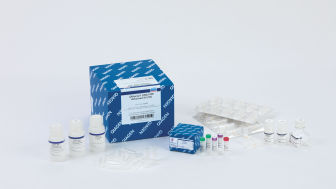
Products
特徴
- 増幅可能なDNAの高回収率
- キシレンなどの溶媒不要でパラフィン除去
- DNA精製時のウラシル(シトシンの脱アミノ化) -ウラシル-N-グリコシラーゼ(UNG)を使用したアーチファクト除去ステップ
- PCR、デジタルPCR(dPCR)、次世代シーケンサー(NGS)にすぐに使えるDNA精製
製品詳細
QIAamp DNA FFPE Advanced Kitのキシレンフリー、洗浄不要の脱パラフィン、二重溶解プロトコール、UCP(ウルトラクリーン下での生産)スピンカラム技術により、FFPE組織から高品質なDNAの回収率を向上させます。
NGS解析向けに回収したDNAを最適化するために、キットのオプションであるUNG処理で核酸の C→U 置換を除去。
QIAamp DNA FFPE Advancedプロトコールは、QIAcube Connectで自動化できます。
パフォーマンス
FFPEのDNA定量の特徴の1つは、さまざまな方法が異なる結果を生み、高いUV-visや蛍光分析値 が必ずしも良好なPCRパフォーマンスを意味しないことです。
リアルタイムPCRまたは定量PCR(qPCR)は、FFPEのダウンストリームに最もよく使われるアプリケーションの1つであり、QIAamp DNA FFPE Advanced Kitは、qPCR用に最適化されています。
QIAamp DNA FFPE Advanced Kitは、UV-visまたは蛍光測定で得られた値に関わりなく、qPCR定量測定で他の製品よりも優れたPCRパフォーマンスを一貫して示しました(図「 PCRパフォーマンス用に最適化」を参照)。
QIAamp DNA FFPE Advanced UNG Kitは、NGS解析で使用するDNAの精製に適しています。FFPEサンプルではありがちな、シトシンの脱アミノ化で生じる人為的なC→T/G→A置換に対処しているからです。(「 人為的 C→T/G→A 置換」を参照)。
QIAamp DNA FFPE Advanced UNGプロトコールは、DNA分離時にUNGを使用したウラシル処理を行うことでNGSにおける一塩基変異(SNV)の偽陽性報告を低減します(図「 人為的 C→T | G→A 置換の劇的な減少」を参照)。
図参照
原理
FFPE組織からDNAを精製する上で3つの大きな課題があります。
- FFPE組織からDNAを精製する上で3つの大きな課題があります。
- ホルマリンによる架橋のため、DNAが増幅されないこと
- 脱アミノ酸シトシンのアーチファクトは、変異解析用のNGSに誤った結果をもたらす
QIAamp DNA FFPE Advanced Kitは、2つの方法で限られたサンプルからDNA収量を最大限、引き出します:
- 2段階の溶解手順を実施して、溶解しにくいサンプルからも高レベルのDNA抽出を実現
- 溶媒によるパラフィン除去を、Deparaffinization Solutionに交換し、初期溶解前の洗浄段階が不要となり、希少なサンプルを失うリスクを最小限に
架橋の除去により、増幅可能なDNAの収率をさらに向上させます(図「 PCRパフォーマンス用に最適化」を参照)。
2回目の溶解前にオプションでUNG処理を行うことにより、シトシンの脱アミノ化によるアーチファクトを除去し、NGS解析に特に適したDNAを得ることができます(表「 NGS用にプライミング」ならびに図「 信頼性の高いdPCRとNGSの結果」、「 人為的 C→T | G→A 置換の劇的減少」を参照)。
図参照
操作手順
QIAamp DNA FFPE Advancedの手順は、簡易化された脱パラフィンステップ、2つの溶解ステップとして脱架橋処理とオプションのアーチファクト除去、そして標準的な結合-洗浄-溶出ステップで構成されています(図「 QIAamp DNA FFPE Advancedワークフロー」を参照)。
図参照
アプリケーション
QIAamp DNA FFPE Advanced Kitを使用したFFPEからのDNA精製は、PCR、dPCR、NGSにすぐに使用することができます。または−30~−15℃で保存することも可能です。
裏付けデータと数値
QIAamp DNA FFPE Advanced workflow.
The QIAamp DNA FFPE Advanced procedure removes paraffin without the tediousness of multiple wash steps, by using Deparaffinization Solution instead of xylene or any other solvent.
Lysis is done with Proteinase K. Cross-links are removed by heat incubation at 90°C for 1 hour. Artifacts can be removed with UNG.
RNA is then digested, and the sample is lysed a second time to increase DNA recovery.
DNA is bound with the QIAamp UCP MinElute spin column. Contaminants are washed off using Buffer AW1, Buffer AW2 and ethanol, and DNA is eluted in Buffer ATE.

Specifications
| Features | Specifications |
|---|---|
| ApplicationsJA | PCR, digital PCR, next-generation sequencing |
| Elution volume | 20–100 µl |
| Format | Spin column |
| Main sample type | Formalin-fixed paraffin-embedded (FFPE) tissue samples |
| Processing | Manual or automated with the QIAcube Connect |
| Purification of total RNA, miRNA, poly A+ mRNA, DNA or protein | Genomic DNA |
| Sample amount | Tissue sections, each with a thickness of 5–10 µm, for a total volume of 4 mm3 |
| Technology | Silica technology |








